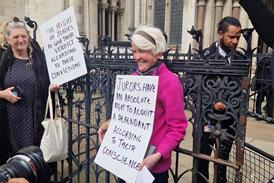Lim v Ong
In Say Chong Lim & others v Chee Kong Ong (a bankrupt) (also known as Francis Ong) [2024] EWHC 373 (Ch), the High Court imposed an immediate custodial sentence of 22 months on the respondent, Mr Ong, in relation to seven counts of contempt of court.

The contempt proceedings followed the trial of a civil fraud claim against the respondent and a number of his companies (see Say Chong Lim & others v Chee Kong Ong & others [2023] EWHC 321 (Ch)). It arose from alleged breaches by the respondent of a worldwide freezing order (WFO) originally granted in May 2020, as well as further orders made following the trial. The total owed by Ong to the claimants was over £6.7m.
The respondent was accused of multiple contempts of court relating to: dissipating assets and granting third-party charges over a proprietary interest, in breach of the WFO; breaching his weekly ordinary living expenses allowance; breaching disclosure obligations; knowingly making false statements in affidavits and statement of affairs; and breaching a requirement to provide information under the trial order.
The respondent initially defended the contempt application and a five-day trial was listed. However, on 27 November 2023 he was made bankrupt and his solicitors came off the record. Following the change of his legal representation, the respondent admitted all of the alleged breaches. The hearing on 20 February 2024 therefore related to sentence only.
In its judgment, the court reiterated the general principles of sentencing for contempt, as set out by the Supreme Court in Attorney General v Crosland [2021] 4 WLR 103, and additional points set out by Leech J in SRA v Khan [2022] EWHC 45 (Ch). The court noted that the admissions by the respondent had the effect that he accepted his actions were intentional, namely he knowingly breached the relevant orders and knowingly included false statements of his assets in various affidavits and his statement of affairs. The court further noted that the orders alleged to have been breached carried prominent penal notices.
The respondent had accepted that his culpability was high, meaning a fine was not considered an appropriate sanction. However, he submitted that his admission was a mitigating factor as it avoided the need for a trial. To this, the court responded that this had occurred at a late stage and only after the other party had expended significant costs preparing for a contested hearing.
The respondent advanced a number of other mitigating factors which the court dealt with in turn. These included giving ‘profound apologies’, which the court acknowledged while pointing out a lack of any attempt by the respondent to rectify his breaches or provide required information. The court stated, ‘it is difficult, therefore, to avoid the conclusion that Mr Ong’s admissions of liability and expressions of remorse are a last-ditch attempt to avoid a significant custodial sentence, rather than being born out of a genuine willingness to make amends’ (paragraph 60).
Other mitigating factors (rejected by the court) included: the pressure of litigation, the pandemic and mounting debts; the negative impact an immediate custodial sentence would have on the respondent’s wife; the assistance Ong was now receiving from an insolvency lawyer; and the respondent’s debts, age, medical issues and mental health. The court also placed ‘no significant weight’ on the fact Ong was a man of good character with no convictions, stating this had been undermined by the findings of fraud and his disregard of the orders. The respondent also referred to R v Arie Ali [2023] EWCA Crim 232 in support of the argument that prison overcrowding should be a reason to suspend any custodial sentence. The court held this was irrelevant for longer sentences such as the one it would impose (in line with the comments in UK Insurance v Syed Ali [2024] EWHC 30 (KB)).
The court found that a starting point of the statutory maximum sentence of two years’ immediate imprisonment was appropriate, reduced by two months to take account of the respondent’s late admissions.
R v Ames
R v Ames [2023] EWCA Crim 1463 concerned an appeal against conviction and sentence. The appellant, David Ames, had been convicted unanimously at Southwark Crown Court of two counts of fraud by abuse of position and sentenced to a total of 12 years’ imprisonment. He was also disqualified from acting as a director for 15 years. In his appeal against sentence, Ames raised the following question of law: ‘What is the necessary ingredient or ingredients of an offence under section 4(1) of the Fraud Act [2006] that one finds in section 4(1)(c)?’
The appellant contended that subsections 4(1)(c)(i) and 4(1)(c)(ii) were each a separate legal ingredient of the offence and so where more than one intent was alleged, the jury must be sure on at least one intention before they can convict. A failure to direct the jury in this way amounted to a material misdirection.
The court disagreed, holding that, ‘both as a matter of structure and language’ there were only three essential ingredients of the section 4 offence, namely a person must:
- occupy a position in which he is expected to safeguard, or not to act against, the financial interests of another person (section 4(1)(a));
- dishonestly abuse his position (section 4(1)(b)); and
- intends, by means of the abuse of that position: (i) to make a gain for himself or another; or (ii) to cause loss to another or to expose another to a risk of loss (section 4(1)(c)).
The use of the word ‘or’ within section 4 did not mean each point was an alternative and independent ingredient of the offence.
Thus, the court held that the jury had been directed properly and the appeal against conviction was dismissed.
The court also dismissed the appeal against sentence, finding that the judge was justified on the facts to impose consecutive sentences and had taken proper account of available mitigation, delay and totality factors.
Sophie Wood is a legal director at Kingsley Napley, London


















![David Lester (senior partner at Blythe Liggins), Darryl Barnes, Jagdeep Sandher (head of dispute resolution at Blythe Liggins)[4]](https://d1d8vslyhr7rdg.cloudfront.net/Pictures/274x183/4/2/8/116428_davidlesterseniorpartneratblytheligginsdarrylbarnesjagdeepsandherheadofdisputeresolutionatblytheliggins4_981603_crop.jpg)








1 Reader's comment